EPISODE 236: RESISTANCE IS I DON'T EVEN KNOW WHAT ANY MORE
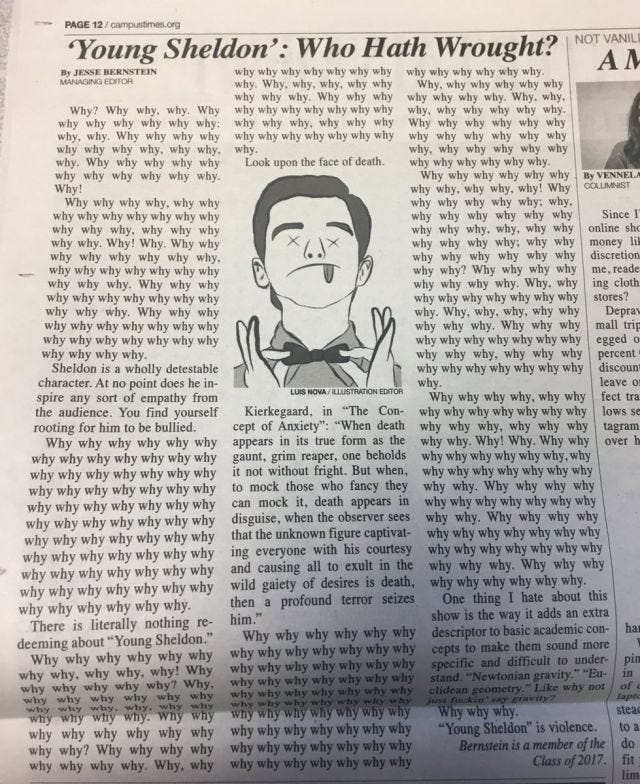
POP CULTURE SPIRIT WOW
Last summer I went to a Comic-Con panel on I don’t know, representation? Stories and education? Something like that. And the way these panels work, there’s usually four or five industry people from comics, TV, movies, whatever, and then the MC, who fires questions at different people.
Usually these things start pretty close to right on time, because over the course of four days there are a million events in each room at Comic-Con, so there’s really no space for things to go long or back up. Every room actually has a person whose sole job is pretty much to make sure things end on time.
But this panel was strange, because everyone on the panel seemed to be there, but then it still didn't start. Five minutes. Seven minutes. Ten minutes. The MC kept looking towards the door, and more than once we were told to stand up, but I couldn’t figure out why.
Then, She walked in.
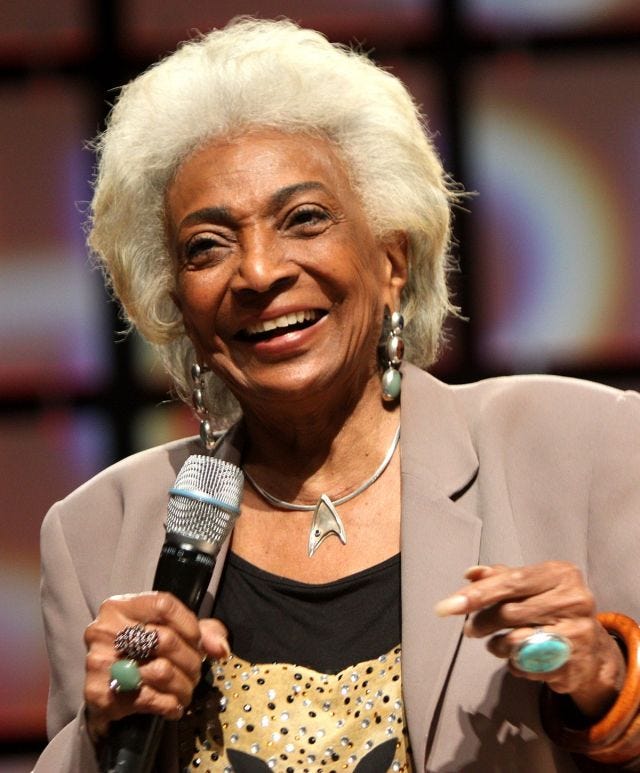
Nichelle Nichols – Uhuru from the original Star Trek series. She’s very fragile at this point, 84 and in need of some help to move her way through the room. (The picture above is not terribly recent, I'd say.)
And holy God did she have presence. It was like finding yourself suddenly in a very small room with the Pope or the Queen. You just FELT her.
What followed was incredibly strange. Ms. Nichols was escorted up to the stage, where she sat in between panelists who were like school teachers and educational comic book writers. And the MC threw her one question, which she answered in a slow, graceful cadence, each word seeming to contain a whole world of experience and reflection and promise...
And then he went on with the panel like she wasn’t there. It was like having the Pope on a panel, asking him the first question and then saying, “Thanks a lot your Holiness. Now Kevin, tell me about your work on Rugrats.” Really, it was like that.
Still, like pretty much everyone else there, I spent the hour just staring at her and trying to get my head around how awed I felt.
The character of Uhuru never really did anything for me. To me she seemed like a receptionist, stuck answering the calls while everyone else got to do the cool stuff. (If you’ve never seen the Sigourney Weaver parody in Galaxy Quest, it is just dead on.)
Today I realize it was the very fact that Nichelle Nichols took that part – she had actually passed on it, she told us, then Martin Luther King (!) talked her into it – that helped created a world in which years later a little white kid from the suburbs of Chicago would no longer see her as significant beyond the fact that her job seemed super boring.
Seeing her there, you just felt all that life that she had lived. All that she gave and felt and gained. Honestly, I don’t know the first thing about her life, but if she was not the definition of holy I don’t know what is.
++
This weekend is the New York Comic Con, which while a far more recent idea has quickly grown even bigger in size than San Diego. So of course I’ve been reading news items all day.
Even if comic conventions are now mostly consumed with big name TV and film stuff, one of the big things that still happens is comic book retailers have the opportunity to meet in private with the big companies to hear about the new books coming and voice any concerns they may have.
As I’ve written here in the past, for as popular as Marvel’s movies remain, its comic book branch is going through some tough times, green-lighting quite a few projects that haven't gotten enough audience traction to last a year.
At the same time, the company has done an amazing job of creating new characters that are both relatable and not your usual white kid with a problem. Like a Muslim girl from Jersey City who gets stretchy powers, or a half-Dominican, half-black kid from Brooklyn who has his own spider bite, or a black girl being raised by a single mom in Chicago who designs armor even better than Tony Stark’s. It’s been amazing, actually, to watch Marvel find a way to generate these all new characters that feel three dimensional and not all “the non-white token version” of an existing character. A real model for how to imagine a more realistically diverse world well.
Then at the spring retailers’ meeting, Marvel’s VP of Sales said Marvel’s slump was due to people being sick of diversity and female characters, and that they were backing away from those characters and stories.
This...did not go over well.
Nor did it seemed based in actual fact.
Today, Marvel had another retailers’ meeting. And this time, not Marvel but some of its retailers started saying some pretty awful things. It began, according to a reporter who was there, with one retailer complaining that there were now too many new female versions of male characters, and that the changes Marvel had made were all happening too fast.
Two other retailers started yelling that diversity didn’t work. According to the reporter “The words ‘black’, ‘homo’ and ‘freaking females’ were used multiple times, at which point other retailers started to boo those retailers and the room started to turn on itself.”
Marvel actually had to stop the meeting early, and according to the story the arguing continued even after.

Yoda, not surprised but not having it.
Now if Marvel had done a bad job with these characters, just played a race or gender card for a cash grab, I could understand people feeling like something was being cheapened, namely those races and/or genders.
But that’s not the case here, any more than it is for Rey and Finn from The Force Awakens or Jyn and the other characters from Rogue One. And yet some fans called for a boycott.
It’s all just a little bit mystifying. Peter Parker, still around, still awesome. Wonder Woman, same. Han Solo...well, okay, not Han Solo, but definitely Luke Skywalker. (Right, Lucasfilm? Please?)
(Speaking of Han Solo, I don’t know if you’ve ever had the strange experience of watching Harrison Ford do an interview – it’s like what if someone wanted to be playing jazz but was forced to sit here and answer stupid questions, but was still mostly thinking about jazz, and also maybe of punching his agent in the face – but this four minute interview of him with Ryan Gosling on British TV is like all of those experiences put together and made so much more weird that it’s actually...funny?)
(Dear Ryan Gosling, When you're done with the Blade Runner 2049 press tour please write a book on your crazy press experiences with Harrison Ford. Because we know they're legion.)

I will get through this. I will get through this. I will get through this.
++
I guess Star Trek: Discovery, whose pilot episodes focused on the relationship between an African American first officer and her Asian captain (also a female), got some online trollflack for being “too diverse”. Someone I saw called it “SJW The Next Generation”. Another called it “Star Trek: Diversity”. Clever.
But the complaints have seemed muted in comparison to Star Wars and other recent properties. (Think about the craziness that surrounded the all-female Ghostbusters, for instance. The things people were saying to Lesley Jones on Twitter...just beyond belief.
And by the way, if you haven’t seen it, that movie was darn good. Four very funny ladies + Thor = Yes.)
Maybe it’s because Star Trek has always tried to mirror society, whether that meant having African American and Asian characters in prominent roles, guys who talk funny (I always wanted to see a Scotty/Chekov sitcom spinoff, with the two of them living together as old men and completely unable to hear or understand one another), or leads that were not white men.
Or maybe it’s the idealism of its fans. Me, I like dark and gritty and sin-riddled (and I’ll take that to go with a side of bacon if you have it). But Star Trek seems to have hope baked into them. For many of them the show is all about what the future can be if we we work at it, what we are at our best.
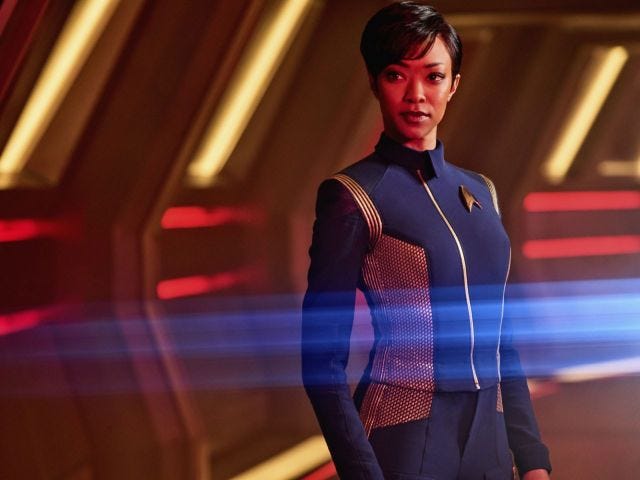
And if you saw the pilot of Discovery, you met a character that fits that well, the new lead Michael Burnham (Sonequa Martin-Green), a xeno-anthropologist so eagerly curious about the cultures of alien species she literally leaps across space at a chance to investigate a strange alien object, even though it’s extraordinarily dangerous.
Things kind of go bad from there for her...and for everybody else...everywhere...Good job, Michael. But those early scenes give us that glimpse of what I think Star Trek fans generally want, characters who look on the universe and the future with hopeful, open, let’s-do-this eyes.
++
My friend AshleyRose Sullivan loves Star Trek so much that she spent the entire year of 2013 re-watching everything Star Trek that there has ever been, and blogging about all of it. It’s called My Year of Star Trek. Here’s the first entry, and here’s the most recent, which has some great insights into Discovery (or as she calls it, Battle-Star-Trek-Galactica).
Some entries have plot summaries, some bring a lot of fun facts. A lot of times the rewatching reminds her of where she was when she first saw the episode, which leads to some really great reflections on her life, too. I think I've mentioned here before. If you like Star Trek, it is for you. It's fantastic.
I’m going to have an interview with AshleyRose next week about her take on all things Trek. Before then if you want a taste, I recommend not only her blog but her clever YouTube series “Generic Ensign”, in which she plays some random ensign on board one of the Trek ships during an episode, making their own ship’s log about the things that have happened. This one is my absolute favorite (wait for it).
More AshleyRose next week!
++
In the meantime, two little Star Trek factoids of my own.
You know the Vulcan hand symbol that goes with “Live Long and Prosper”? Turns out, all of that came from Leonard Nimoy. The first time we were going to see Spock with other Vulcans, Nimoy thought there should be some kind of gesture or ritual to give a taste of their culture. The script had suggested the Vulcan T’Pau would put her hands on his shoulders, but to Nimoy that seemed like a violation, given the fact that Vulcans read minds via touch.
(Imagine if every time your mom kissed you on the cheek she learned everything you’d been doing and/or thinking about.)

So instead he told the crew how when he was a kid he’d gone to services at this Orthodox Jewish synagogue. And at this one point of blessing, the congregation was told to cover its eyes. “The light from this Deity could be very damaging,” Nimoy relayed in an interview reported in the Washington Post. ‘So we are told to protect ourselves by closing our eyes.”
“They get their tallits over their heads, and they start this chanting. And my father said to me, ‘Don’t look’.”
But Nimoy couldn’t quite help himself. “I thought, ‘something major is happening here.’ So I peeked. . And I saw them with their hands stuck out from beneath the tallit like this” [he shows the reporter his hands in the classic Vulcan “V”]. “I had no idea what was going on, but the sound of it and the look of it was magical.”
The Star Trek staff was so taken by his story, they wrote it right in. “It just touched a magic chord.” Even the words “Live Long and Prosper” according to Nimoy are derived from the Jewish prayer.
(Fun twist: Celia Lovsky, the actress playing the Vulcan T’Pau who uses that gesture in that first episode, could not make her hands stay like that. So they shot her first with her fingers out of frame, then cut briefly to her hands in the proper position.)

"...hate...you...Nimoy..."
++
The other bit of trivia, more a question that comes from that topic of diversity. The Borg, the techno-human hive mind bad guys from Star Trek: The Next Generation who are probably the greatest Star Trek villains of all time, are a combination of white skin and technology.
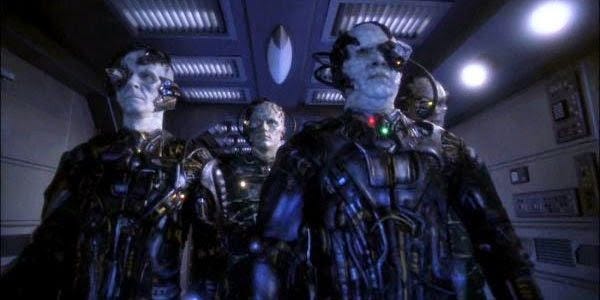
Hi, table for 3-in-1?
But by “white” I don’t just mean that they’re pale. As far as I can tell, there’s no Borg that aren’t Caucasian. Probably I’m wrong, but checking out this Pinterest page filled with nothing but photos of Borg (#LifeIssues), it’s striking that the only Borg that isn’t white is a black Vulcan who isn’t really a Borg but is just in disguise. (Borg are so totally bad ass, they had to write in some super serious blind spots to explain why we’re not all now wearing ear buds and staring at computer screens in our hand...
Heyyyy. Wait a second...
So we’ve got this white technologically advanced/screwed up race, whose whole mission is to forcibly assimilate other species. Truly, that’s their call sign: “Resistance is futile. You will be assimilated.”
And as if that weren’t enough, who first teaches the crew about the Borg? Whoopi Goldberg’s mysterious bartender character Guinan, who is apparently super old (so old Gene Roddenberry thought she might be the ancestor of some of the people on the Enterprise; “I always assumed that Picard was one of my great-great-great-great-great grandkids," Goldberg said at a 2016 convention), and one of the last of her people, the El-Aurians. At some point in the past her species was “swarmed” and razed by the Borg. Aka enslaved or killed.
So yeah, probably I'm the last person to realize this, but seems like the Borg are pretty much a straight up allegory about white supremacy.
Or any racial/ethnic supremacy, I guess. He says, feeling uncomfortable.
(When I was studying theology in Cambridge, one of the teachers I lived with who was a huge Star Trek fan used to call the Jesuits from my province the Borg. This did not seem like a compliment. When I asked him about it, he laughed and just said “You will be assimilated.”
It still does not seem like a compliment.)
++ THE GOOD PLACE PLACE YOUR BETS ++
Okay so I don’t know if you’re keeping up with NBC’s Heaven and Hell show The Good Place. But it’s gotten pretty crazy and spiritual so I’m going to talk about it here and in doing so I’m going to spoil the first season finale and the first couple episodes of the second season, so if you haven’t seen all that but you want to watch it (and you should watch it because it’s so much fun and only 22 minutes) now is the time to turn away.
Here I'll even insert a long visual to keep your eye from unintentionally seeing any spoilers while you decide.
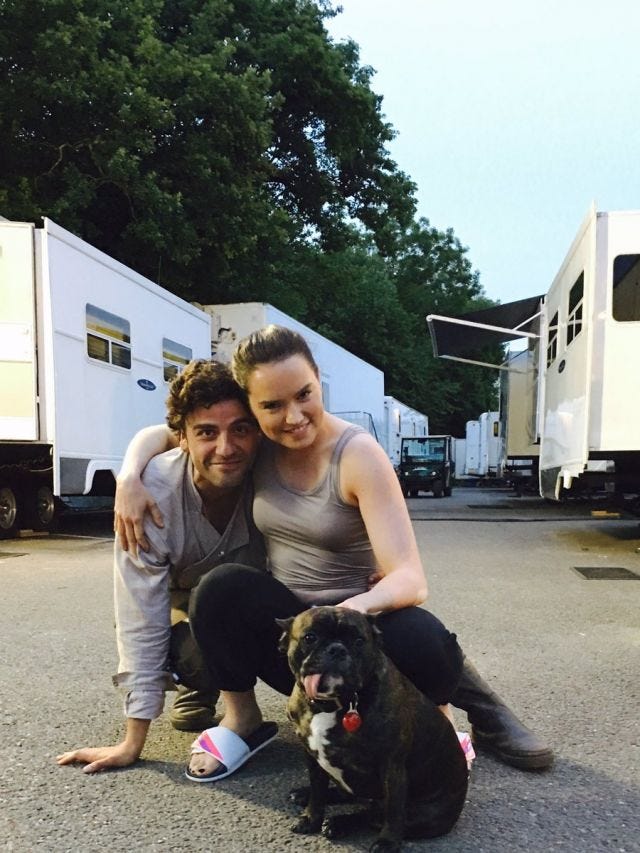
69 DAYS!
So, if you’ve kept reading you know that in fact the cast of The Good Place is actually not in the Good Place but in the Bad Place, put there by Ted Danson’s apprentice architect devil Michael as an experimental new form of torture that is less flames and bite marks and more “Hell is other people”.
In the second season premiere, Michael has rebooted the system after the inmates have figured out they’re in Hell. But by the episode’s end they’ve figured it out again. Then last week we watch them figure it out over and over and over again. It doesn’t happen instantaneously each time, by the episode's end they’ve clearly spent years running in Michael’s maze. But they do keep solving it.
In addition, main characters Eleanor and Chidi keep ending up with each other. Last week Becky, who lives outside the system in the Medium Place (which, What the heck is that, actually?), tells Eleanor she and Chidi really are basically soul mates, they just keep being forced to forget it.
Which makes me wonder – could the different places in The Good Place serve different purposes for different people? Like, could it be that for Eleanor and Chidi and the others, The Bad Place is actually more like a Purgatory Place, an Ouch Place, if you will? (Still workshopping the name). Whereas for Michael – and I attribute this idea entirely to my friend Tom Brennan, who you’ve met in these pages before – this actually is The Bad Place, he's not a devil at all but someone the devils are messing with.
Or maybe it’s just the Ouch Place, but for all the characters, including Michael, and in the end this whole show is going to have been in addition to awesome the origin story for the Angel Michael?
I have no idea how they keep the emotional arc of the show going, with all the reset hijinks they're doing. The whole thing could quickly flame out. But it’s so much fun right now.
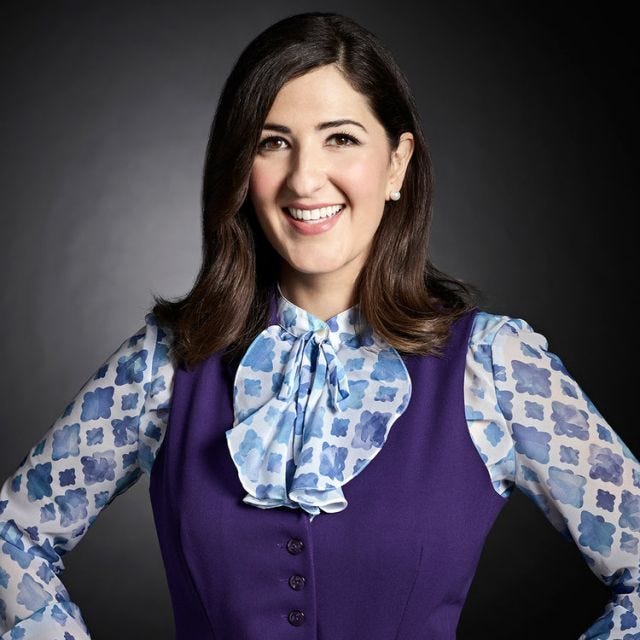
(Also, what's the deal with Janet? Is she really just a robot?
Because her storyline seems exactly the same as the main characters.)
++ LINKS ++
God it's been a rough week. And I don’t know about you, but I just can’t do any more outrage. At this point it’s poop or get off the sink.
(What? When you were a kid your mom didn’t insist you poop in the sink? Where did you go then, the shower?)
Each of us makes our own decisions about how to help build the world we want to live in. Right now it doesn’t seem like there’s enough of us doing enough to try and end gun violence, or we haven't quite cracked how to get crack the strength of the forces that oppose even the slightest iota of it. (How many kids died at Newtown? How many polls have said that even most Republican voters support some reforms? And still we’ve got nothing.
Representative Steve Scalise was on the news saying anyone who asks these questions is just pushing their own political agenda. The man was shot by a crazy person with a gun himself four months ago. It’s cuckoo.)
So sadness for those poor families, and for the people of Las Vegas? I've got that. But outraged tweets and endless reading the same news stories we get every couple months just about different versions of the same thing? No thanks. (Wait: Is this The Bad Place?)

DAMN IT.
For now, let's gather up around the campfire and try to remember what makes life so worth living.
To help, here's three things I loved this week:
Ryan Gosling, freaking out about the font used for the title of the film Avatar.
The band The Academic, using the fact that Facebook Live has a sight delay before it begins filming to create a really cool version of their song “Bear Claws”.
And how one NPR staffer accidentally posting to NPR’s Facebook instead of their personal account helped everyone get through Monday.
You are loved and important to a lot of people you don't even know.
Have a good week.

